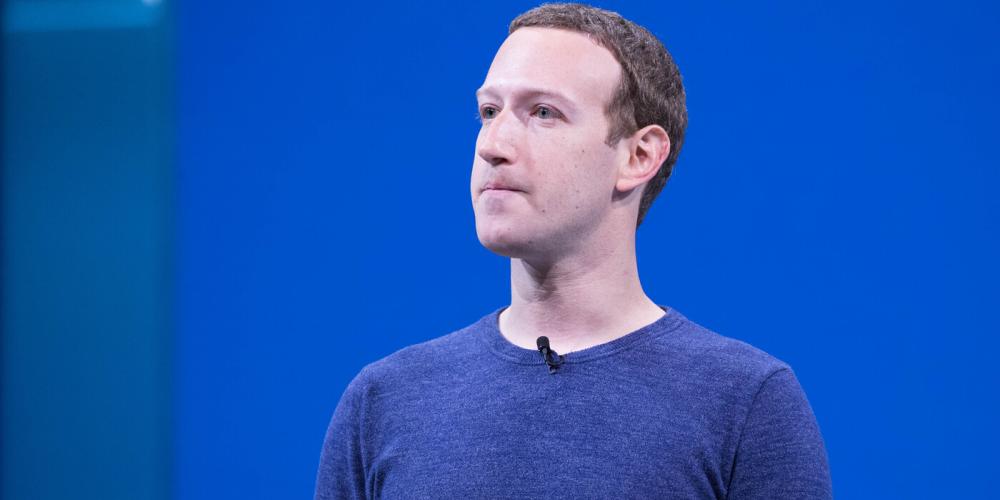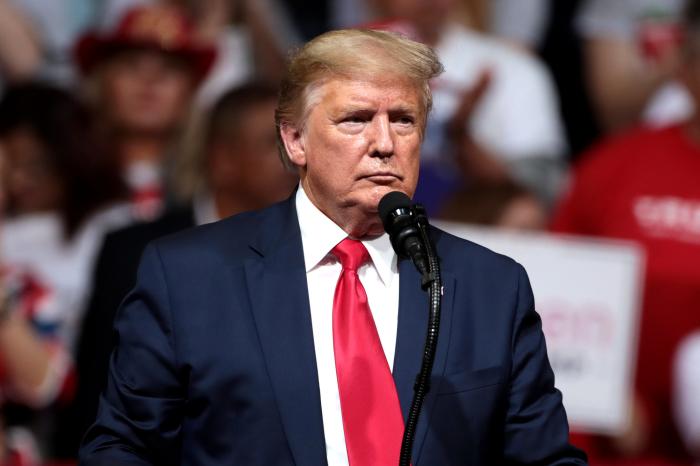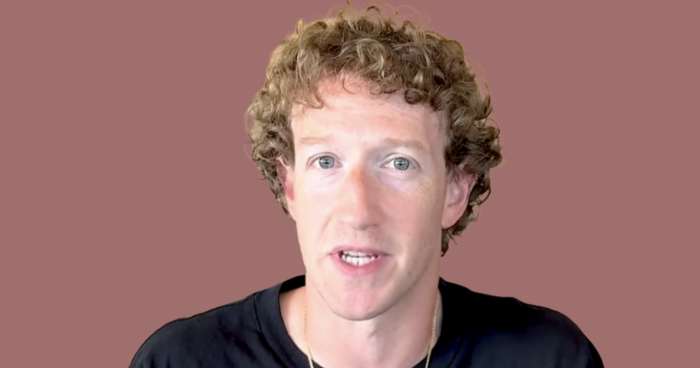Zuckerberg Delivers Coded Rebuke to Civil-Rights Activists

I didn’t think it was possible, but Facebook has reached a new and defining low.
Weeks after refusing to meet with civil-rights leaders in Atlanta, CEO Mark Zuckerberg instead set up shop yesterday at Georgetown University to read a highly publicized “manifesto” on “freedom of expression.”
For about 30 minutes, Zuckerberg attempted to wax poetic on the virtues of Facebook and his own definitions of free speech and expression.
At best, his framing was grounded in far-right politics. At worst, much of his speech constituted a stern rebuke to advocates at Color Of Change, Free Press, NAACP Legal Defense Fund, the Southern Poverty Law Center and others who have challenged the hate run amok on Facebook.
Zuckerberg repeatedly invoked Martin Luther King Jr. and Black Lives Matter as he condemned so-called attacks on “free expression” — a stunning display of anti-Blackness reminiscent of last year’s revelation that his organization secretly hired a GOP firm to run a smear campaign against Color Of Change while publicly feigning a partnership with the organization.
But it didn’t stop there.
Damning words
I’d like to highlight a few portions of Zuckerberg’s speech that spell out his disdain for civil rights, his intention to continue platforming hate and violence, his singular focus on the profitability of Facebook Inc., and his refusal to responsibly manage the world’s largest information-publishing platform.
“Some people believe giving more people a voice is driving division rather than bringing us together. More people across the spectrum believe that achieving the political outcomes they think matter is more important than every person having a voice. I think that’s dangerous. Today I want to talk about why, and some important choices we face around free expression.”
Let’s be clear: The “some people” he’s referring to here are civil-rights groups that have called on Facebook and other Big Tech companies to crack down on hateful activities including harassment, recruitment, fundraising and organizing.
These calls reached a fever pitch in 2017 when activist Heather Heyer was killed and dozens of others injured in Charlottesville following the hateful “Unite the Right” rally that was organized in part via Facebook.
The next year, more than 50 human-rights, civil-rights and digital-rights organizations including Free Press united to create the Change the Terms coalition, which collaborated with technologists to develop a suite of recommended policies for disrupting hateful activities online. These groups have repeatedly called on Facebook, Twitter, YouTube and many others to proactively address the proliferation of hate on their platforms.
The “political outcomes” Zuckerberg scorned in his speech would include decreases in hate crimes and a safer environment for Facebook users who happen to be women, people of color, members of the LGBTQIA+ community and religious minorities — and, the protection of their rights to free expression, too.
Though he attempted to be subtle and oblique throughout the speech, his message was clear. He is calling out civil-rights and racial-justice activists and their calls for deplatforming. This is clear since we know the far right is fine with their adversaries being online — likely because it makes them easier to target with abuse.
Who is Zuckerberg protecting?
Excerpted below is the most intellectually dishonest and frighteningly ahistorical portion of Zuckerberg’s speech.
“So giving people a voice and broader inclusion go hand in hand, and the trend has been towards greater voice over time. But there’s also a counter-trend. In times of social turmoil, our impulse is often to pull back on free expression. We want the progress that comes from free expression, but not the tension.
“We saw this when Martin Luther King Jr. wrote his famous Letter from Birmingham Jail, where he was unconstitutionally jailed for protesting peacefully. We saw this in the efforts to shut down campus protests against the Vietnam War. We saw this way back when America was deeply polarized about its role in World War I, and the Supreme Court ruled that socialist leader Eugene Debs could be imprisoned for making an anti-war speech.”
The “tension” of those times and ours was not between advocates of free speech and detractors. The tension was, as it is now, between the powerful and the disenfranchised.
Today, the real counter-trend is the whitelash in response to the rise of movements for racial and gender justice, immigrant rights and LGBTQIA+ liberation. The abilities of marginalized communities to speak out — on Facebook and elsewhere — has drawn the ire of right-wing xenophobes, typified by complaints about “PC police” and “cancel culture” — and rallied most loudly by Hatemonger-in-Chief Donald Trump.
The 45th president of the United States represents the zenith of white-nationalist power that defined this country’s founding and continues to propagate a social and economic hierarchy. The “tension” Zuckerberg and others feel is their slipping grasp on that power, as people of other identities increasingly assert our humanity, dignity and agency.
The whitelash is real.
Hate crimes are rising. Neo-Nazism is surging. But Mark Zuckerberg's response is to protect the status quo of power and oppression, and ensure that the most violent and extreme voices of white supremacy maintain access to amplification via his private platform. And he’s invoking the name of Martin Luther King Jr. to legitimize all of this:
“In the end, all of these decisions were wrong. Pulling back on free expression wasn’t the answer and, in fact, it often ended up hurting the minority views we seek to protect.”
MLK wasn't jailed because society he was “pulling back” on free expression. MLK was jailed, and ultimately murdered, because he was fighting for freedom of expression he had never accessed as a Black person living in the United States’ racial and ethnic caste system. And the forces that killed him are the same ones now using Facebook to continue chilling the rights of Black people who continue his activism today.
But Mark Zuckerberg’s limited view of the world is centered on whiteness, and therefore the free expression he envisions is limited to people like him — educated, wealthy white people who are allegedly the only ones intellectually equipped to be arbiters of right and wrong.
“From where we are now, it seems obvious that, of course, protests for civil rights or against wars should be allowed. Yet the desire to suppress this expression was felt deeply by much of society at the time.”
“Much of society” would actually be white society. Much of recorded history ignores the perspectives of millions of non-white people, largely because their voices were oppressed. They were restricted from voting, owning media stations, and otherwise participating in society. They fought back, risked and lost their lives in the ongoing battle against white supremacy.
“Today, we are in another time of social tension. We face real issues that will take a long time to work through — massive economic transitions from globalization and technology, fallout from the 2008 financial crisis, and polarized reactions to greater migration. Many of our issues flow from these changes.”
The issues we face are far more complex than the naive and simplistic view Zuckerberg offers here. There is no A vs. B, right vs. wrong, left vs. right. We are in a time when powerful forces of corporatization, monopoly and authoritarianism are villainizing the traditionally disenfranchised here in the United States and globally — similar to the rise of the Third Reich in post-World War I Germany.
“The third challenge to expression is the hardest because it comes from our culture. We’re at a moment of particular tension here and around the world — and we’re seeing the impulse to restrict speech and enforce new norms around what people can say.
“Increasingly, we’re seeing people try to define more speech as dangerous because it may lead to political outcomes they see as unacceptable. Some hold the view that since the stakes are so high, they can no longer trust their fellow citizens with the power to communicate and decide what to believe for themselves.
“I personally believe this is more dangerous for democracy over the long term than almost any speech.”
Zuckerberg's reckless reign
Zuckerberg is right about one thing: These are dangerous times.
But only because deeply uninformed men such as himself hold the reins to government, media and Big Tech — the powerful platforms that shape our access to information, health, finance, education, community, employment and just about every basic need. His willingness to blithely dismiss centuries of human-rights activism, critical race theory and power analysis to affirm his private monopoly’s policies of opaqueness, false equivalency and ethnocentrism is both flabbergasting and chilling.
The only thing more dangerous is our leaders’ willingness to allow it.
“Frankly, I don’t think we should be making so many important decisions about speech on our own either. We’d benefit from a more democratic process, clearer rules for the internet, and new institutions.
“That’s why we’re establishing an independent Oversight Board for people to appeal our content decisions.”
Nice try, Zuckerberg.
Facebook does need oversight — but not from within. While an independent Oversight Board sounds positive, the fact that Zuckerberg would remain in charge at Facebook leaves little doubt that it will be constructed and managed in a way that is ahistorical, uncritical and largely centered on the construct of whiteness as the default of human experience.
If this board is created by Facebook leaders, it will only continue that company’s enablement of white supremacy.
I’m not calling for government oversight of Facebook. I’m calling for a public reckoning with the way that companies like Facebook operate. At the heart of this issue is the business model of the attention economy, which has rapidly devolved into hate-for-profit.
It’s also time for Mark Zuckerberg to step down as CEO and board president. His ability to act with impunity in the face of ongoing scandals and abuses is representative of the greater issue of Facebook recklessness.
Zuckerberg and Facebook have a right to be reckless — but not at the expense of millions of lives, and a few democracies, too.
The days of moderate, well-meaning white leaders like Zuckerberg appeasing the extremists among them in the name of “fairness” will end. The question is whether the Zuckerbergs of the world will lift a finger to help effect the fundamental change they espouse on banners and in hashtags.
To that end, I offer Zuckerberg a quote from Rev. Dr. Martin Luther King Jr. at the beginning of Letter From a Birmingham Jail, which Zuckerberg woefully mischaracterized this week. King began the letter with words I hope Zuckerberg and his fellow Facebook leaders will carefully consider:
“I have almost reached the regrettable conclusion that the Negro’s great stumbling block in his stride toward freedom is not the White Citizen’s Council-er or the Ku Klux Klanner, but the white moderate, who is more devoted to 'order' than to justice; who prefers a negative peace which is the absence of tension to a positive peace which is the presence of justice.”





